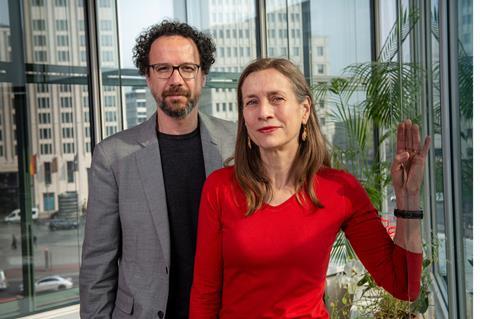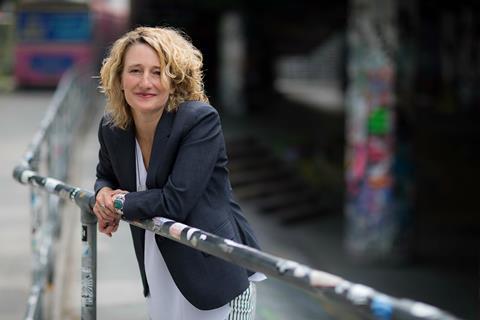
Change is afoot at the Berlinale, but not just yet. This year marks the fifth in the five-year incumbency of Carlo Chatrian and Mariette Rissenbeek, a period forever defined by the Covid pandemic.
The pair took over from Dieter Kosslick, who had been at the helm for 18 years. Italy-born Chatrian had most recently been artistic director at Locarno Film Festival, while Rissenbeek (who was born in the Netherlands but has lived in Berlin for many years) joined from her position as managing director of export and promotional agency German Films and a member of the selection committee that appointed the Berlinale heads.
Chatrian and Rissenbeek enjoyed one edition, otherwise known as the final film festival of the modern era, in February 2020. The next year’s edition went online, while 2022 was a hybrid event that took place on the eve, as it turned out, of another convulsive event: Russia’s invasion of Ukraine. The pair’s second full festival was only in 2023; now, as they put the finishing touches to what is their final edition, Chatrian and Rissenbeek talk to Screen International.
The Berlinale is many different things to different people — the German and international industry, Berlin audiences, Hollywood. How do you define the role of the Berlinale in 2024?
Mariette Rissenbeek: The audience is one of our big assets and we want to present the programme for the audience here in Berlin. But we’re part of the international film industry. We’re very important at the beginning of the year for independent filmmakers. And at the same time, we need to have the visibility of the festival internationally. We need [to have] some interesting names on the red carpet.
How do you pitch the Berlinale when negotiating for films?
Carlo Chatrian: Berlin offers a place for films to be presented at a particular time of the year. We also have a very strong, vibrant market. And coming to Berlin, you can have a sense of how a normal audience, rather than an audience of pure cinephiles, will react to your film. Berlin is a very unique city, very political, very young.
When you both took on the roles five years ago, how much were you asked to entice the US industry back to Berlin?
Chatrian: The connection between Berlin and the US, both the independent and studio scene, has always been very strong. Of course, we always want to do better. I think this year we have achieved a very good combination. The fact we can award a master like Martin Scorsese [with an honorary Golden Bear], and at the same time open with Cillian Murphy [who stars in Tim Mielants’ Small Things Like These], even though the film is half Irish, half US — it’s a good sense of where we want to play.
Is there a pressure to secure world premieres?
Chatrian: In Competition we want to have as many world premieres as possible, but it’s the quality of the films that matters. This year we have 19 world premieres out of 20. Last year, we had 16 out of 19. For me it doesn’t make a difference but when it comes to the market side, yes, it’s better to have world premieres because we can offer the film a better visibility. In Special, we have Loves Lies Bleeding, which premiered at Sundance, as an out of competition screening alongside Treasure with Lena Dunham, which is a world premiere. For me, both are equally strong.
How did Covid and its impact transform your vision for the festival when you came in?
Rissenbeek: It was a full stop after the first edition we did together in February 2020. We weren’t able to evaluate the festival; the films weren’t able to travel. There were no releases, there were no other festivals. Getting the concept for the two Covid versions took a lot of time and a lot of energy and a lot of ideas. And then being very patient and waiting to see how everything developed. You only knew four weeks before the festival what you could do. That absorbed our total energy. Only after 2022 could we start thinking, “How do we want to build on this?”
Chatrian: From the start we had discussed [that] we wanted to focus the festival more. In that sense doing the two Covid versions was good, because we had to reduce the number of films anyway and we continued on that path.
How many films do you have this year compared to 2020?
Chatrian: This year we have 239 films including shorts, retrospectives and classics. Last year we had 286, and in 2020 we had a bit more than 300.
One of the challenges must have been how difficult it is to budget and forecast for each festival when each edition is completely different.
Rissenbeek: In the two Covid years, 2021 and 2022, there was extra money from the Ministry of Culture. But doing the 2023 edition was difficult because you didn’t have any real ground on which to do the calculations or know how much inflation would raise costs compared to 2022. Now we know the results of 2023, the 2024 budget is easier to handle and I hope the planning of the 2025 budget will have more good ground for it. We also received extra money this year from the ministry and also from the city of Berlin. I’m very glad the city now is on board again with €2m ($2.1m). This festival is a very important economic factor for the city. It will contribute the same amount for 2025. We already confirmed that.
What’s the budget for this year?
Rissenbeek: Around €33m [$35.4m]. That’s the festival and the market. Cannes has two separate budgets but we are always accounted together.
What have been the other big challenges to navigate?
Rissenbeek: We are in a big city and there’s an infrastructure of cinemas but that infrastructure changes. You have to respond to what you can get. In 2019 in December, the Cinestar multiplex closed down in Potsdamer Platz so we lost space here. In 2023, CinemaxX reduced the seats in each of the screening rooms and the capacity went down by 55%. [The cinema is now focused on press and industry screenings.] You have to find new solutions, which, for such a big festival, is not easy.
In 2027, the contract with the Berlinale Palast in Potsdamer Platz runs out. You must be relieved that particular challenge Is not yours to face?
Rissenbeek: Tricia [Tuttle, incoming festival director for 2025] comes from a big city — London — which also can’t be easy for finding locations. She has to think about what kind of solutions to find… whether she wants to stay here [in Potsdamer Platz] or whether she wants to find another location.
Is there a possibility of the Berlinale renewing the contract with the Palast in Potsdamer Platz and staying put?
Rissenbeek: The Berlinale is renting the Berlinale Palast from the venue operator Live Nation and it has different shows. Berlinale has the one-side option to extend the contract up to 2030. But this requires that Live Nation still has a contract as venue operator of the theatre [with owner Brookfield Properties]. So it depends on what Live Nation is going to do and what the plans will be. The Berlinale is an event which gives a lot of life to Potsdamer Platz and I cannot imagine anyone says, “I don’t want this festival to happen here.” But this is my personal opinion.

You have mentioned Tricia, and the Berlinale is moving to a single directorship. Carlo, is it correct to say you turned down the chance to do it on your own?
Chatrian: No, it’s not completely accurate because there was never this kind of discussion. I consider myself as an artistic director. We didn’t discuss with the ministry changing my job title to another one.
What are the strengths of working as a partnership at the head of a big festival like the Berlinale?
Chatrian: I enjoy working with Mariette very much. I consider this kind of job as a collective thing. I can hardly imagine being alone, doing everything. Also, from a psychological point of view, the challenges and tasks are so many that having someone on your side you can talk to about different elements is important to me. I discussed with Mariette things that are related to the programme, the opening film, the honorary Golden Bear.
After five eventful years running one of the biggest film festivals, how do you believe festivals must evolve to stay relevant?
Rissenbeek: We have to connect very closely with the young audience and find ways to build these connections. We have connections with the audience because we have the Generation section. Carlo included a number of films from streamers, which provides a connection to another audience [demographic] besides the arthouse one that goes to the cinema.
Chatrian: Without movie theatres, without big venues, the Berlinale itself will be different. And in the future, I don’t know how many big theatres will be able to keep going. I’m talking about venues that are above 500 seats or 1,000 seats. It’s more and more difficult to find these places. And when you don’t use this theatre and you use other places, you disconnect what you’re doing with the life of movie theatres.
One of the big changes this year has been rolling Perspektive Deutsches Kino (PDK) into the festival’s other sections. How has the German industry responded?
Rissenbeek: PDK is more for the film schools. It’s for new talent. The reaction of the film schools and of the young filmmakers [to close PDK] was quite strong because they felt they were losing the protection they had. But the German film industry is rather looking for films which are in a position where they find attention. And that is much more the case in the other sections [of the Berlinale].
Chatrian: In Germany there is a film festival focusing on German films, on young voices that takes place in January: Max Ophüls. That is not to say PDK didn’t have reason to exist; it did. The thing that we have done, it’s not a huge change, it’s more a psychological change. We have more or less the same number of young films in the programme. This year, we have 11 films competing for an award dedicated to first and second feature-length films. Simply, we have tried to integrate these films into our line-up. The German producers who work with emerging filmmakers prefer to have a film in a section.
Given the new director is going to be doing such a big job, how important is it for Tricia to learn German and be able to have those conversations?
Chatrian: I did speak a bit of German but I cannot say I’m fluent. As I am in charge more on the artistic side the exchanges were handled in English, even when they were happening with the German film industry. In the festival, in daily life, in the room, in the offices, we do speak more German. For my job it was important. It’s also a sign of respect to show you appreciate the culture and the place you’re living in. But to perform my job as artistic director, I wouldn’t say it was necessary.
Do you have an ambition to run another big film festival?
Chatrian: I can see myself working for other film festivals. It doesn’t have to be the biggest festival in the world.
Mariette, you have known you were leaving since last March. What are you doing next?
Rissenbeek: I will work as an adviser with Zimbabwean filmmaker Tsitsi Dangarembga, who was on our jury in 2022, on her scriptwriting workshop. And I’ll be around for another six months to help onboard Tricia Tuttle.
Carlo, will you be around?
Chatrian: So far we haven’t discussed anything, so my contract expires on March 1.

























No comments yet